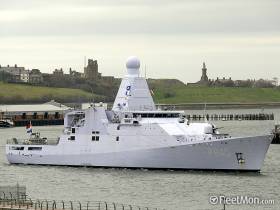Displaying items by tag: Trade Call
Dutch Visit Ireland On Trade Call to Cork City
#HollandVisit- A Royal Netherlands Navy ship is to visit Cork City for crew rest and recreation in addition to promoting Dutch trade and business interests in the Munster region, writes Jehan Ashmore.
HNLMS Holland the leadship of its namesake class of around 3,750 tons full displacement is to enter Cork Harbour today. The Offshore Patrol Vessel is to berth at North Custom House Quay in the Cork City and remain until Tuesday.
Among the Dutch firms attending the trade events, is the engineering company Royal HaskoningDHV which has been appointed by Irish Water to the Dublin Ringsend Wastewater Treatment Plant project team. Royal Haskoning are to provide expertise on its sustainable wastewater reduction treatment technology.
As for the HNLMS Holland, she shares the same shipbuilder of the ILV Granuaile, the Commissioner of Irish Lights aids to navigation tender that was launched at Damen Shipyards Galați in Romania. Both vessels were also fitted-out at the Dutch group’s facilities back in the Netherlands.
The Holland class are designed to fulfill patrol and intervention tasks against lightly armed opponents, such as pirates and smugglers, noting the Dutch overseas territories in the Caribbean.
At the same time they are equipped to cope with much higher level electronic and radar surveillance capabilities used for military stabilization and security roles, short of outright war.
A surveillance system, Thales is integrated into the mast which integrates communication systems and where there are two 4-faced phased arrays for air and surface search.
At the stern are aviation facilities of a fully equipped hangar and flight deck for one medium-sized helicopter.






























































